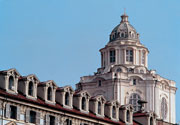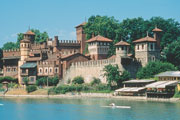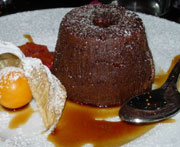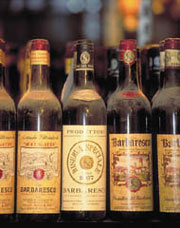|
Torino, capital of Piedmont and of Torino prov., NW Italy, at the confluence of the Po and Dora Riparia rivers. It is a majortransportation hub and Italy's most important industrial center. Manufactures include motor vehicles, tires, textiles, clothing, machinery, electronic equipment, leather goods, furniture, chemicals, and vermouth.It is an international fashion center .
Portrait
Torino is an ancient city, which was Italy’s first capital, and is now a great industrial district. Each moment in history has left its mark on the city, creating a legacy of culture, architecture and monuments.
 |
|
Torino,San-Lorenzo-church
|
Now? Well, Torino is looking ahead now, more than ever, focused on becoming a meeting point for different cultures, and a reference point for development of new technologies and production sectors: a modern metropolis that will host the 2006 Winter Olympic Games.
Nature
Green is the dominant colour of Torino in satellite shots. Over 17 million square metres of pure nature: 18 square metres of green per resident, 300,000 flowers grown each year in public gardens, as well as 400 kilometres of tree-lined avenues with over 60,000 plants, 100,000 trees in public gardens and 70 kilometres of parks along the banks of 4 rivers: a heritage that quadruplicated in the last 30 years.
Nature has been generous with Torino: the lovely Chieri and Monferrato hills to the south; to the north, the breathtaking skyline of the Alps ,and a decisive factor for choosing Torino as host for the 20th Winter Olympics.
Art and culture
 |
|
Torino,Medioeval-village
|
Torino stands ever more for culture with a capital C, with art not only in its museums. The streets of the city are crammed with literary and artistic creations, even the walls now play their part. Torino has gained recognition in Italy and abroad as one of the liveliest cities that constantly expresses its intrinsic desire for beauty not only in a tradition embodied in its dance, theatre and design schools but also in its attention to talented young artists and its more experimental, modern attitude to culture. Torino is one of the European capitals of Contemporary Art.
A city that was the birthplace of Arte Povera, a city inspired by the exuberance of the Futurist movement and the creativity of Felice Casorati. Torino is thronged with private galleries, Foundations and permanent exhibitions. Without forgetting a suite of museums that ranges from the Castello di Rivoli to the Galleria d’Arte Moderna e Contemporanea, Museo Egizio, Museo del Cinema and the Museo dell’Automobile.
In November, “Luci d’Artista” will set the city ablaze with the illuminated creations of major international artists.
The industry of taste
 |
| Torino, capital of chocolate |
Torino, a city with a thousand faces and a thousand tastes. Its food and wine tradition makes it one of the world's food and drink capitals. The art of confectionery and cheese, wines and aperitifs, chocolate and coffee demonstrate that this fame is fully deserved.
This is a sector which has always combined tradition with technical development. Here in 1786, Benedetto Carpano invented vermouth, the Torino aperitif par excellence - created by the expert blending of wine with thirteen dierent ingredients.
 |
| Sweets and cheeses, wines and aperitifs, chocolate and coffee for a city with a thousand tastes |
Torino is home to a bakery product famous worldwide: the grissino. As far back as 1663, a French dictionary listed the "pain long du Piemont". The fame of these fragrant bread sticks goes back to that era and (according to legend) saved the young Vittorio Amedeo II, a child of poor health.
If chocolate is food for the gods, then Turin is their adopted home: no city can boast such a deep-rooted tradition, such inventive craftsmen and such a widespread passion for the pleasures of life. Enter the pastry and chocolate shops of the city to become familiar with the rich creations now famous around the world. The gianduiotti, the pinguino and the bicerin are waiting for you, to be tasted among the rich décor of the city's historic cafés.
From history to modern industrial production, here are some of the most important names in the food and drink industry: Lavazza, a leading international coffee producer; Carpano, Marchesi di Barolo and Martini & Rossi, which make wines and liqueurs; and, naturally, the confectionery companies - from the multinational Ferrero to the handmade Peyrano chocolates.
Sport
Italy’s first rowing, tennis, horse-riding and artistic gymnastics clubs were founded in Torino. It’s where skis were used for the first time, where the first ice skating facilities were built, and where Italy’s firstice hockey game was played. This is where legendary football teams were established, and where the dreams of many a champion have come true.
|
